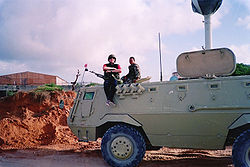United Nations Security Council Resolution 837
UN Security Council Resolution 837 | |
|---|---|
| Date: | 6 June 1993 |
| Meeting no.: | 3,229 |
| Code: | S/RES/837 (Document) |
| Vote: | For: 15 Abs.: 0 Against: 0 |
| Subject: | Somalia |
| Result: | Adopted |
| Security Council composition in 1993: | |
| permanent members: | |
| non-permanent members: | |
 | |
| Egyptian troops in Somalia | |
Acting under Chapter VII of the United Nations Charter, the Council re-emphasised the importance of the early implementation of the disarmament of all Somali parties, factions and movements, as well as neutralizing radio broadcasting systems that contributed to attacks towards United Nations forces. It also demanded that all parties in Somalia comply with the commitments they had undertaken in the agreements they concluded at the informal Preparatory Meeting on Somali Political Reconciliation in Addis Ababa, Ethiopia, reaffirming that the Secretary-General Boutros Boutros-Ghali is authorised to take action against those responsible for the armed attacks against UNOSOM II to establish its authority throughout Somalia.[2]
The Council concluded by encouraging the deployment of all UNOSOM II contingents to meet the full requirements of 28,000 men; urging Member States to contribute equipment to the Operation; and for the Secretary-General to report back on the situation within seven days of the adoption of the current resolution.
It was on this resolution that the decision was made to arrest General Mohamed Farrah Aidid who was responsible for the attack, although he was not captured.[3]
[edit] See also
- History of Somalia
- List of United Nations Security Council Resolutions 801 to 900 (1993 – 1994)
- Somali Civil War
[edit] References
- ^ Durch, William J. (1996). UN peacekeeping, American politics, and the uncivil wars of the 1990s. Palgrave Macmillan. p. 343. ISBN 978-0312160753.
- ^ Sarooshi, Danesh (2000). The United Nations and the development of collective security: the delegation by the UN Security Council of its chapter VII powers. Oxford University Press. p. 190. ISBN 978-0198299349.
- ^ Bedjaoui, Mohammed (1994). The new world order and the Security Council: testing the legality of its acts. Martinus Nijhoff Publishers. p. 50. ISBN 978-0792334347.
[edit] External links
| Wikisource has original text related to this article: |
| |||||

